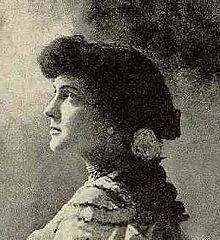Delmira Agustini
Delmira Agustini (born October 24, 1886 in Montevideo ; † July 6, 1914 there ) was a Uruguayan poet. She is one of the greatest Latin American poets of the early 20th century.
Life
Born in Montevideo as the daughter of an upper-class Montevidean middle class family of German, French and Argentine descent or, according to other sources, of Italian origin, it quickly became clear that she was an extremely gifted child. She started writing poetry at the age of ten, while she also learned French, music and painting. Her first book was El libro blanco , which she published in 1907. Cantos de la mañana followed three years later . Some of her works have also been published in the journal Apolo .
Agustini married Enrique Job Reyes on August 14, 1913, but left him two months later and divorced him on June 5, 1914. A month later, Reyes shot Agustini twice in the head and then committed suicide.
The main subjects of her poetry are eroticism and death, about which she wrote with unusual frankness; the verses are characterized by extraordinary and rich imagery. Eros , the god of love, symbolizes eroticism for her and was an inspiration for Agustini. He appears frequently in her poems. She even dedicated her third book Los cálices vacíos to him .
Works
- El libro blanco. 1907.
- Cantos de la mañana. 1910.
- Los cálices vacíos. 1913.
- El rosario de Eros. 1924, posthumously.
- Los astros del abismo. 1924, posthumously.
- Correspondencia íntima. 1969, posthumously.
- Poesías completas. 1971.
- Delmira Agustini, Antología. 1986.
literature
- Fernández dos Santos, Mirta: La recepción crítica de la obra de Delmira Agustini por sus contemporáneos: A través de su correspondencia inédita y poco difundida . Iberoamericana, Madrid / Vervuert, Frankfurt a. M. 2019. ISBN 9788491920557
- Hans-Jürgen Schmitt: Like with a knife drawn in the night. Delmira Agustini - Alfonsina Storni - Alejandra Pizarnik. The life and death of three Latin American poets . Ammann Verlag, Zurich 2000. ISBN 3-250-30004-7
- Seibert, Birgit: Delmira Agustini's Interpretation of Modernismo: The Origin of a Female Poet's Voice in Latin America . Palm and Enke, Erlangen / Jena 2003. ISBN 3-7896-0827-0
- Dr. Maria-Elena (Malena) Barreiro de Armstrong: Eros, eje de la estructura pendular en << Los calices vacios >> de Delmira Agustini . Edition Reichenberger, Kassel 1998. ISBN 3-931887-18-9
Poems in German
- Erna Pfeiffer (Ed.): AMORica Latina. My continent - my body. Erotic texts by Latin American authors . Vienna: Wiener Frauenverlag 1991. ISBN 3-900399-50-6
Web links
- Literature by and about Delmira Agustini in the catalog of the German National Library
- Biography in "Spanish American women writers: a bio-bibliographical source book," p. By Diane E. Marting
Individual evidence
- ^ "Salomé decapitada: Delmira Agustini y la estética finisecular de la ...", p.118 by Tina Escaja
- ↑ "Escritoras uruguayas: una antología crítica", p.18ff by Renée Sum Scott
- ^ "Antología de la poesía amorosa española e hispanoamericana" by Víctor de Lama
- ^ "Uruguay in Pictures" by Alison Behnke
- ↑ Ulrike Mühlschlegel : Apolo. Revista de Arte y Sociología . FID Latin America. March 6, 2018.
| personal data | |
|---|---|
| SURNAME | Agustini, Delmira |
| BRIEF DESCRIPTION | Uruguayan poet |
| DATE OF BIRTH | October 24, 1886 |
| PLACE OF BIRTH | Montevideo |
| DATE OF DEATH | July 6, 1914 |
| Place of death | Montevideo |

